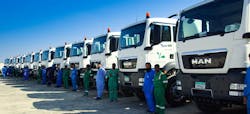Aqualia awarded two contracts, worth €100M in United Arab Emirates
MADRID, JAN 11, 2019 -- AqualiaMACE, Aqualia's subsidiary in the United Arab Emirates, became the winning bidder of two important operation and maintenance contracts (O&M) in the Emirate of Abu Dhabi. The contract involves the operation and maintenance of the sanitation system of the capital, Abu Dhabi, as well as of the islands of Al Reem, Al Maryah and Al Saadiyat. In addition, the authorities of the United Arab Emirates have renewed the sanitation management contract in Al Ain, Eastern zone of Abu Dhabi, in which the company is already providing its services to over 650,000 inhabitants. The combined value of these contracts is 100 million euros.
With this new contract, the company will manage the sanitation services for the capital's inhabitants and manage 1,320 kilometres of sanitation networks, as well as 54 waste water pumping stations, supplying a total of 280,000 m3/day (more than 100,000 million litres per year). In addition, the contract includes a treatment station in Saadiyat Island, which uses the membrane bioreactor technology (MBR). Likewise, the contract includes the septic tank drainage services and the management of the two dumping points of the island of Abu Dhabi and Saadiyat.
Aqualia's bid won over the bids of other internationally renowned companies, such as Veolia, SAUR, Metito and Kharafi, the leading companies of the United Arab Emirates. This is a "performance-based" contract, which establishes very high performance requirements, since it is governed by KPIs (Key Performance Indicators). Each contract includes over thirty of these parameters, which include efficiency, the environment, quality or health and safety. The tender specifications determine the minimum requirement thresholds that must be met and the applicable penalties/bonuses applied, based on performance.
Al Ain sewage network trucks.
Renewal of the contract in Al Ain in recognition for the company's successful performance
In addition, Aqualia has renewed its operation and maintenance contract to manage the sewerage and waste water treatment systems of the East zone of the Emirate of Abu Dhabi over the next 7 years, which includes the city of Al Ain, the second largest in the Emirate of Abu Dhabi. The contract has been renewed by authorities of the United Arab Emirates in recognition for the high performance rates achieved by Aqualia, which manages over 2,000 kilometres of networks, 69 pumping stations and 14 treatment plants.
Both contracts consolidate the leadership of the consortium led by Aqualia in the Emirate, in which it manages the waste water of almost two thirds of the population. The company employs almost 500 people of 17 different nationalities to cater for the needs of the inhabitants. Approximately 70% of the staff are Indian and Pakistani (operators, labourers, drivers, etc.), including South Asian nationals, such as employees from Bangladesh or the Philippines.
Luis de Lope, International Director of Aqualia, stated that "over these years, the effort of our teams in the region has allows us to win contracts in four different countries (Saudi Arabia, United Arab Emirates, Qatar and Oman), as well as receive the recognition of the authorities for our successful performance".
Aqualia also manages other projects in the region, such as the sanitation system of Al Dhakhira (Qatar), which it shall operate over the next 10 years. The project will be developed by the consortium formed with the South Korean company Hyundai and will include the construction of a treatment plant that will provide its services to over 205,000 inhabitants.
In Oman, Aqualia operates the hydraulic installations of Sohar Port, one of the most important ports in the north of the country. This contract poses a challenge of a high technical complexity, since it includes many different water catchment and pumping, desalination, supply, treatment and sewerage infrastructures.
The total value of the contracts managed by Aqualia in the Arabian Peninsula (Saudi Arabia, UAE and Oman) is approximately €600 million. The projects, most of which are executed as medium and long-term concessions, represent successful models of collaboration between public institutions and private entities, aimed at achieving progress and well-being. With these projects, Aqualia caters for the needs of six million of the region's inhabitants.

